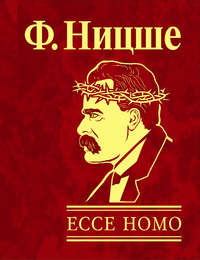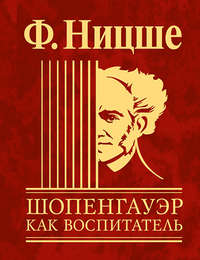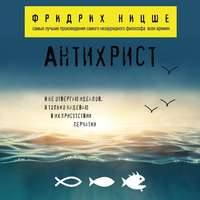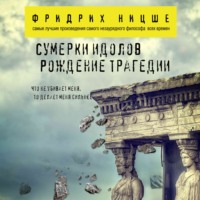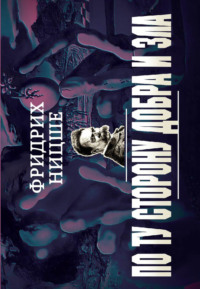 полная версия
полная версияHuman, All-Too-Human: A Book For Free Spirits; Part II
Occasional Harmfulness of Knowledge. – The utility involved in the unchecked investigation of knowledge is so constantly proved in a hundred different ways that one must remember to include in the bargain the subtler and rarer damage which individuals must suffer on that account. The chemist cannot avoid occasionally being poisoned or burnt at his experiments. What applies to the chemist, is true of the whole of our culture. This, it may be added, clearly shows that knowledge should provide itself with healing balsam against burns and should always have antidotes ready against poisons.
14The Craving of the Philistine. – The Philistine thinks that his most urgent need is a purple patch or turban of metaphysics, nor will he let it slip. Yet he would look less ridiculous without this adornment.
15Enthusiasts. – With all that enthusiasts say in favour of their gospel or their master they are defending themselves, however much they comport themselves as the judges and not the accused: because they are involuntarily reminded almost at every moment that they are exceptions and have to assert their legitimacy.
16The Good Seduces to Life. – All good things, even all good books that are written against life, are strong means of attraction to life.
17The Happiness of the Historian. – “When we hear the hair-splitting metaphysicians and prophets of the after-world speak, we others feel indeed that we are the ‘poor in spirit,’ but that ours is the heavenly kingdom of change, with spring and autumn, summer and winter, and theirs the after-world, with its grey, everlasting frosts and shadows.” Thus soliloquised a man as he walked in the morning sunshine, a man who in his pursuit of history has constantly changed not only his mind but his heart. In contrast to the metaphysicians, he is happy to harbour in himself not an “immortal soul” but many mortal souls.
18Three Varieties of Thinkers. – There are streaming, flowing, trickling mineral springs, and three corresponding varieties of thinkers. The layman values them by the volume of the water, the expert by the contents of the water – in other words, by the elements in them that are not water.
19The Picture of Life. – The task of painting the picture of life, often as it has been attempted by poets and philosophers, is nevertheless irrational. Even in the hands of the greatest artist-thinkers, pictures and miniatures of one life only – their own – have come into being, and indeed no other result is possible. While in the process of developing, a thing that develops, cannot mirror itself as fixed and permanent, as a definite object.
20Truth will have no Gods before it. – The belief in truth begins with the doubt of all truths in which one has previously believed.
21Where Silence is Required. – If we speak of freethinking as of a highly dangerous journey over glaciers and frozen seas, we find that those who do not care to travel on this track are offended, as if they had been reproached with cowardice and weak knees. The difficult, which we find to be beyond our powers, must not even be mentioned in our presence.
22Historia in Nuce.– The most serious parody I ever heard was this: “In the beginning was the nonsense, and the nonsense was with God, and the nonsense was God.”4
23Incurable. – The idealist is incorrigible: if he be thrown out of his Heaven, he makes himself a suitable ideal out of Hell. Disillusion him, and lo! he will embrace disillusionment with no less ardour than he recently embraced hope. In so far as his impulse belongs to the great incurable impulses of human nature, he can bring about tragic destinies and later become a subject for tragedy himself, for such tragedies as deal with the incurable, implacable, inevitable in the lot and character of man.
24Applause Itself as the Continuation of the Play. – Sparkling eyes and an amiable smile are the tributes of applause paid to all the great comedy of world and existence – but this applause is a comedy within a comedy, meant to tempt the other spectators to a plaudite amici.
25Courage for Tedium. – He who has not the courage to allow himself and his work to be considered tedious, is certainly no intellect of the first rank, whether in the arts or in the sciences. – A scoffer, who happened for once in a way to be a thinker, might add, with a glance at the world and at history: “God did not possess this courage, for he wanted to make and he made all things so interesting.”
26From the Most Intimate Experience of the Thinker. – Nothing is harder for a man than to conceive of an object impersonally, I mean to see in it an object and not a person. One may even ask whether it is possible for him to dispense for a single moment with the machinery of his instinct to create and construct a personality. After all, he associates with his thoughts, however abstract they may be, as with individuals, against whom he must fight or to whom he must attach himself, whom he must protect, support and nourish. Let us watch or listen to ourselves at the moment when we hear or discover a new idea. Perhaps it displeases us because it is so defiant and so autocratic, and we unconsciously ask ourselves whether we cannot place a contradiction of it by its side as an enemy, or fasten on to it a “perhaps” or a “sometimes”: the mere little word “probably” gives us a feeling of satisfaction, for it shatters the oppressive tyranny of the unconditional. If, on the other hand, the new idea enters in gentle shape, sweetly patient and humble, and falling at once into the arms of contradiction, we put our autocracy to the test in another way. Can we not come to the aid of this weak creature, stroke it and feed it, give it strength and fulness, and truth and even unconditionality? Is it possible for us to show ourselves parental or chivalrous or compassionate towards our idea? – Then again, we see here a judgment and there a judgment, sundered from each other, never looking at or making any movement towards each other. So we are tickled by the thought, whether it be not here feasible to make a match, to draw a conclusion, with the anticipation that if a consequence follows this conclusion it is not only the two judgments united in wedlock but the matchmakers that will gain honour. If, however, we cannot acquire a hold upon that thought either on the path of defiance and ill-will or on that of good-will (if we hold it to be true) – then we submit to it and do homage to it as a leader and a prince, give it a chair of honour, and speak not of it without a flourish of trumpets: for we are bright in its brightness. Woe to him who tries to dim this brightness! Perhaps we ourselves one day grow suspicious of our idea. Then we, the indefatigable “king-makers” of the history of the intellect, cast it down from its throne and immediately exalt its adversary. Surely if this be considered and thought out a little further, no one will speak of an “absolute impulse to knowledge”!
Why, then, does man prefer the true to the untrue, in this secret combat with thought-personalities, in this generally clandestine match-making of thoughts, constitution-founding of thoughts, child-rearing of thoughts, nursing and almsgiving of thoughts? For the same reason that he practises honesty in intercourse with real persons: now from habit, heredity, and training, originally because the true, like the fair and the just, is more expedient and more reputable than the untrue. For in the realm of thought it is difficult to assume a power and glory that are built on error or on falsehood. The feeling that such an edifice might at some time collapse is humiliating to the self-esteem of the architect – he is ashamed of the fragility of the material, and, as he considers himself more important than the rest of the world, he would fain construct nothing that is less durable than the rest of the world. In his longing for truth he embraces the belief in a personal immortality, the most arrogant and defiant idea that exists, closely allied as it is to the underlying thought, pereat mundus, dum ego salvus sim! His work has become his “ego,” he transforms himself into the Imperishable with its universal challenge. It is his immeasurable pride that will only employ the best and hardest stones for the work – truths, or what he holds for such. Arrogance has always been justly called the “vice of the sage”; yet without this vice, fruitful in impulses, Truth and her status on earth would be in a parlous plight. In our propensity to fear our thoughts, concepts and words, and yet to honour ourselves in them, unconsciously to ascribe to them the power of rewarding, despising, praising, and blaming us, and so to associate with them as with free intellectual personalities, as with independent powers, as with our equals – herein lie the roots of the remarkable phenomenon which I have called “intellectual conscience.” Thus something of the highest moral species has bloomed from a black root.
27The Obscurantists. – The essential feature of the black art of obscurantism is not its intention of clouding the brain, but its attempt to darken the picture of the world and cloud our idea of existence. It often employs the method of thwarting all illumination of the intellect, but at times it uses the very opposite means, seeking by the highest refinement of the intellect to induce a satiety of the intellect's fruits. Hair-splitting metaphysicians, who pave the way for scepticism and by their excessive acumen provoke a distrust of acumen, are excellent instruments of the more subtle form of obscurantism. – Is it possible that even Kant may be applied to this purpose? Did he even intend something of the sort, for a time at least, to judge from his own notorious exposition: “to clear the way for belief by setting limitations to knowledge”? – Certainly he did not succeed, nor did his followers, on the wolf and fox tracks of this highly refined and dangerous form of obscurantism – the most dangerous of all, for the black art here appears in the garb of light.
28By what Kind of Philosophy Art is Corrupted. – When the mists of a metaphysical-mystical philosophy succeed in making all æsthetic phenomena opaque, it follows that these phenomena cannot be comparatively valued, inasmuch as each becomes individually inexplicable. But when once they cannot be compared for the sake of valuation, there arises an entire absence-of-criticism, a blind indulgence. From this source springs a continual diminution of the enjoyment of art (which is only distinguished from the crude satisfaction of a need by the highest refinement of taste and appreciation). The more taste diminishes, the more does the desire for art change and revert to a vulgar hunger, which the artist henceforth seeks to appease by ever coarser fare.
29On Gethsemane. – The most painful thing a thinker can say to artists is: “Could ye not watch with me one hour?”
30At the Loom. – There are many (artists and women, for instance) who work against the few that take a pleasure in untying the knot of things and unravelling their woof. The former always want to weave the woof together again and entangle it and so turn the conceived into the unconceived and if possible inconceivable. Whatever the result may be, the woof and knot always look rather untidy, because too many hands are working and tugging at them.
31In the Desert of Science. – As the man of science proceeds on his modest and toilsome wanderings, which must often enough be journeys in the desert, he is confronted with those brilliant mirages known as “philosophic systems.” With magic powers of deception they show him that the solution of all riddles and the most refreshing draught of true water of life are close at hand. His weary heart rejoices, and he well-nigh touches with his lips the goal of all scientific endurance and hardship, so that almost unconsciously he presses forward. Other natures stand still, as if spellbound by the beautiful illusion: the desert swallows them up, they become lost to science. Other natures, again, that have often experienced these subjective consolations, become very disheartened and curse the salty taste which these mirages leave behind in the mouth and from which springs a raging thirst – without one's having come one step nearer to any sort of a spring.
32The So-called “Real Reality.” – When the poet depicts the various callings – such as those of the warrior, the silk-weaver, the sailor – he feigns to know all these things thoroughly, to be an expert. Even in the exposition of human actions and destinies he behaves as if he had been present at the spinning of the whole web of existence. In so far he is an impostor. He practises his frauds on pure ignoramuses, and that is why he succeeds. They praise him for his deep, genuine knowledge, and lead him finally into the delusion that he really knows as much as the individual experts and creators, yes, even as the great world-spinners themselves. In the end, the impostor becomes honest, and actually believes in his own sincerity. Emotional people say to his very face that he has the “higher” truth and sincerity – for they are weary of reality for the time being, and accept the poetic dream as a pleasant relaxation and a night's rest for head and heart. The visions of the dream now appear to them of more value, because, as has been said, they find them more beneficial, and mankind has always held that what is apparently of more value is more true, more real. All that is generally called reality, the poets, conscious of this power, proceed with intention to disparage and to distort into the uncertain, the illusory, the spurious, the impure, the sinful, sorrowful, and deceitful. They make use of all doubts about the limits of knowledge, of all sceptical excesses, in order to spread over everything the rumpled veil of uncertainty. For they desire that when this darkening process is complete their wizardry and soul-magic may be accepted without hesitation as the path to “true truth” and “real reality.”
33The Wish to be Just and the Wish to be a Judge. – Schopenhauer, whose profound understanding of what is human and all-too-human and original sense for facts was not a little impaired by the bright leopard-skin of his metaphysic (the skin must first be pulled off him if one wants to find the real moralist genius beneath) – Schopenhauer makes this admirable distinction, wherein he comes far nearer the mark than he would himself dare to admit: “Insight into the stern necessity of human actions is the boundary line that divides philosophic from other brains.” He worked against that wonderful insight of which he was sometimes capable by the prejudice that he had in common with the moral man (not the moralist), a prejudice that he expresses quite guilelessly and devoutly as follows: “The ultimate and true explanation of the inner being of the entirety of things must of necessity be closely connected with that about the ethical significance of human actions.” This connection is not “necessary” at all: such a connection must rather be rejected by that principle of the stern necessity of human actions, that is, the unconditioned non-freedom and non-responsibility of the will. Philosophic brains will accordingly be distinguished from others by their disbelief in the metaphysical significance of morality. This must create between the two kinds of brain a gulf of a depth and unbridgeableness of which the much-deplored gulf between “cultured” and “uncultured” scarcely gives a conception. It is true that many back doors, which the “philosophic brains,” like Schopenhauer's own, have left for themselves, must be recognised as useless. None leads into the open, into the fresh air of the free will, but every door through which people had slipped hitherto showed behind it once more the gleaming brass wall of fate. For we are in a prison, and can only dream of freedom, not make ourselves free. That the recognition of this fact cannot be resisted much longer is shown by the despairing and incredible postures and grimaces of those who still press against it and continue their wrestling-bout with it. Their attitude at present is something like this: “So no one is responsible for his actions? And all is full of guilt and the consciousness of guilt? But some one must be the sinner. If it is no longer possible or permissible to accuse and sentence the individual, the one poor wave in the inevitable rough-and-tumble of the waves of development – well, then, let this stormy sea, this development itself, be the sinner. Here is free will: this totality can be accused and sentenced, can atone and expiate. So let God be the sinner and man his redeemer. Let the world's history be guilt, expiation, and self-murder. Let the evil-doer be his own judge, the judge his own hangman.” This Christianity strained to its limits – for what else is it? – is the last thrust in the fencing-match between the teaching of unconditioned morality and the teaching of unconditioned non-freedom. It would be quite horrible if it were anything more than a logical pose, a hideous grimace of the underlying thought, perhaps the death-convulsion of the heart that seeks a remedy in its despair, the heart to which delirium whispers: “Behold, thou art the lamb which taketh away the sin of God.” This error lies not only in the feeling, “I am responsible,” but just as much in the contradiction, “I am not responsible, but some one must be.” That is simply not true. Hence the philosopher must say, like Christ, “Judge not,” and the final distinction between the philosophic brains and the others would be that the former wish to be just and the latter wish to be judges.
34Sacrifice.– You hold that sacrifice is the hallmark of moral action? – Just consider whether in every action that is done with deliberation, in the best as in the worst, there be not a sacrifice.
35Against the “Triers of the Reins” of Morality. – One must know the best and the worst that a man is capable of in theory and in practice before one can judge how strong his moral nature is and can be. But this is an experiment that one can never carry out.
36Serpent's Tooth. – Whether we have a serpent's tooth or not we cannot know before some one has set his heel upon our necks. A wife or a mother could say: until some one has put his heel upon the neck of our darling, our child. – Our character is determined more by the absence of certain experiences than by the experiences we have undergone.
37Deception in Love. – We forget and purposely banish from our minds a good deal of our past. In other words, we wish our picture, that beams at us from the past, to belie us, to flatter our vanity – we are constantly engaged in this self-deception. And you who talk and boast so much of “self-oblivion in love,” of the “absorption of the ego in the other person” – you hold that this is something different? So you break the mirror, throw yourselves into another personality that you admire, and enjoy the new portrait of your ego, though calling it by the other person's name – and this whole proceeding is not to be thought self-deception, self-seeking, you marvellous beings? – It seems to me that those who hide something of themselves from themselves, or hide their whole selves from themselves, are alike committing a theft from the treasury of knowledge. It is clear, then, against what transgression the maxim “Know thyself” is a warning.
38To the Denier of his Vanity. – He who denies his own vanity usually possesses it in so brutal a form that he instinctively shuts his eyes to avoid the necessity of despising himself.
39Why the Stupid so often Become Malignant. – To those arguments of our adversary against which our head feels too weak our heart replies by throwing suspicion on the motives of his arguments.
40The Art of Moral Exceptions. – An art that points out and glorifies the exceptional cases of morality – where the good becomes bad and the unjust just – should rarely be given a hearing: just as now and again we buy something from gipsies, with the fear that they are diverting to their own pockets much more than their mere profit from the purchase.
41Enjoyment and Non-enjoyment of Poisons. – The only decisive argument that has always deterred men from drinking a poison is not that it is deadly, but that it has an unpleasant taste.
42The World without Consciousness of Sin. – If men only committed such deeds as do not give rise to a bad conscience, the human world would still look bad and rascally enough, but not so sickly and pitiable as at present. – Enough wicked men without conscience have existed at all times, and many good honest folk lack the feeling of pleasure in a good conscience.
43The Conscientious. – It is more convenient to follow one's conscience than one's intelligence, for at every failure conscience finds an excuse and an encouragement in itself. That is why there are so many conscientious and so few intelligent people.
44Opposite Means of Avoiding Bitterness. – One temperament finds it useful to be able to give vent to its disgust in words, being made sweeter by speech. Another reaches its full bitterness only by speaking out: it is more advisable for it to have to gulp down something – the restraint that men of this stamp place upon themselves in the presence of enemies and superiors improves their character and prevents it from becoming too acrid and sour.
45Not to be Too Dejected. – To get bed-sores is unpleasant, but no proof against the merits of the cure that prescribes that you should take to your bed. Men who have long lived outside themselves, and have at last devoted themselves to the inward philosophic life, know that one can also get sores of character and intellect. This, again, is on the whole no argument against the chosen way of life, but necessitates a few small exceptions and apparent relapses.
46The Human “Thing in Itself.” – The most vulnerable and yet most unconquerable of things is human vanity: nay, through being wounded its strength increases and can grow to giant proportions.
47The Farce of Many Industrious Persons. – By an excess of effort they win leisure for themselves, and then they can do nothing with it but count the hours until the tale is ended.
48The Possession of Joy Abounding. – He that has joy abounding must be a good man, but perhaps he is not the cleverest of men, although he has reached the very goal towards which the cleverest man is striving with all his cleverness.
49In the Mirror of Nature. – Is not a man fairly well described, when we are told that he likes to walk between tall fields of golden corn: that he prefers the forest and flower colours of sere and chilly autumn to all others, because they point to something more beautiful than Nature has ever attained: that he feels as much at home under big broad-leaved walnut trees as among his nearest kinsfolk: that in the mountains his greatest joy is to come across those tiny distant lakes from which the very eyes of solitude seem to peer at him: that he loves that grey calm of the misty twilight that steals along the windows on autumn and early winter evenings and shuts out all soulless sounds as with velvet curtains: that in unhewn stones he recognises the last remaining traces of the primeval age, eager for speech, and honours them from childhood upwards: that, lastly, the sea with its shifting serpent skin and wild-beast beauty is, and remains to him, unfamiliar? – Yes, something of the man is described herewith, but the mirror of Nature does not say that the same man, with (and not even “in spite of”) all his idyllic sensibilities, might be disagreeable, stingy, and conceited. Horace, who was a good judge of such matters, in his famous beatus ille qui procul negotiis puts the tenderest feeling for country life into the mouth of a Roman money-lender.
50Power without Victory. – The strongest cognition (that of the complete non-freedom of the human will) is yet the poorest in results, for it has always had the mightiest of opponents – human vanity.
51Pleasure and Error. – A beneficial influence on friends is exerted by one man unconsciously, through his nature; by another consciously, through isolated actions. Although the former nature is held to be the higher, the latter alone is allied to good conscience and pleasure – the pleasure in justification by good works, which rests upon a belief in the volitional character of our good and evil doing – that is to say, upon a mistake.
52The Folly of Committing Injustice. – The injustice we have inflicted ourselves is far harder to bear than the injustice inflicted upon us by others (not always from moral grounds, be it observed). After all, the doer is always the sufferer – that is, if he be capable of feeling the sting of conscience or of perceiving that by his action he has armed society against himself and cut himself off. For this reason we should beware still more of doing than of suffering injustice, for the sake of our own inward happiness – so as not to lose our feeling of well-being – quite apart from any consideration of the precepts of religion and morality. For in suffering injustice we have the consolation of a good conscience, of hope and of revenge, together with the sympathy and applause of the just, nay of the whole of society, which is afraid of the evil-doer. Not a few are skilled in the impure self-deception that enables them to transform every injustice of their own into an injustice inflicted upon them from without, and to reserve for their own acts the exceptional right to the plea of self-defence. Their object, of course, is to make their own burden lighter.



